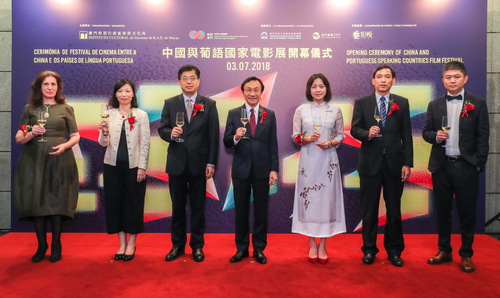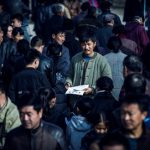 Group photo of the officiating guests at the opening ceremony of the “China and Portuguese-speaking Countries Film Festival”.
Group photo of the officiating guests at the opening ceremony of the “China and Portuguese-speaking Countries Film Festival”.
Organized by the Cultural Affairs Bureau, the “Encounter in Macao – Arts and Cultural Festival between China and Portuguese-speaking Countries” offers a series of events in July, of which the “China and Portuguese-speaking Countries Film Festival”, officially opened on 3 July with the screening of the opening film Wrath Of Silence at the Macao Cultural Centre, under enthusiastic and lively atmosphere.
The opening ceremony was held on 3 July, at 7:45pm, at the Macao Cultural Centre, and was officiated by the Secretary for Social Affairs and Culture, Alexis Tam Chon Weng; the Director of the Department of Publicity and Culture of the Liaison Office of the Central People’s Government in the Macao S.A.R., Wan Sucheng; the Counselor of the Office of the Commissioner of the Ministry of Foreign Affairs of the People’s Republic of China in the Macao S.A.R., Qiu Weiwei; the President of the Cultural Affairs Bureau, Mok Ian Ian; the Acting President of the Macao Government Tourism Office, Hoi Io Meng; the Executive Director of the “Sound & Image Challenge International Festival”, Lúcia Lemos; and the producer of Opening Film Wrath Of Silence and founder of the FIRST International Film Festival in Xining, Song Wen. After the opening ceremony, the guests watched the opening film Wrath Of Silence. Song Wen, producer of the film, conducted a post-screening talk with the public afterwards.
The “China and Portuguese-speaking Countries Film Festival” is the first event of the “Encounter in Macao – Arts and Cultural Festival between China and Portuguese-speaking Countries”, featuring 24 films in three sections, namely “Films in Chinese”, “Films in Portuguese” and “Images, Macao” which will be held from 30 June until 13 July at the Macao Cultural Centre and Cinematheque‧Passion. The Festival’s program will present several excellent productions, including the first film by Portuguese film master Manoel de Oliveira, four modern Chinese films, nine award winning productions shot in Portuguese-speaking countries such as Portugal, Brazil, Cape Verde, Mozambique, Guinea-Bissau and South Africa, as well as a specially curated session entitled “Images, Macao”, which features nine films in Chinese and Portuguese by Portuguese directors shot in Macao between 1923 and 2015.
The “China and Portuguese-speaking Countries Film Festival” aims to establish a platform of cinematographic exchange between China and Portuguese-speaking countries, increasing the public’s interest in excellent films in two languages, and allowing the local audience to broaden their horizons and further understand the latest cinematographic developments of China and Portuguese-speaking countries.
The “Encounter in Macao – Arts and Cultural Festival between China and Portuguese-speaking Countries” is organized by the Cultural Affairs Bureau, and is co-organized by the Macao Government Tourism Office and the Macao Post and Telecommunications Bureau. For more information about the “China and Portuguese-speaking Countries Film Festival”, please visit the thematic website of the Cultural Affairs Bureau (www.icm.gov.mo/FCP) or website of the Cinematheque‧Passion (www.cinematheque-passion.mo). The free brochure can be obtained at the lobby of the Cinematheque‧Passion. Tickets are available at the Cinematheque‧Passion or through the website of the Cinematheque‧Passion. For enquiries, please contact the Cinematheque‧Passion through tel. no. 2852 2585, during office hours.
View gallery


